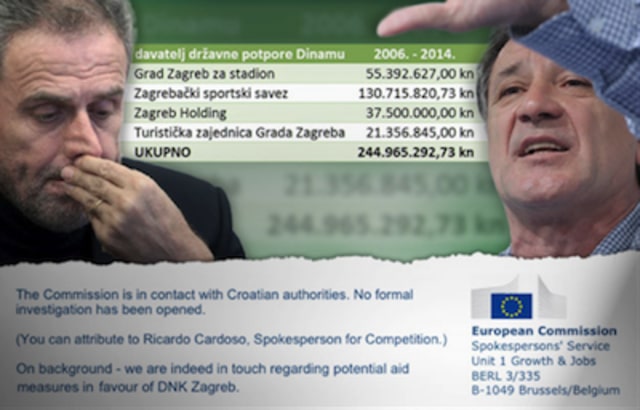The granting of exclusive rights may confer an advantage but does not in itself result in transfer of state resources. Private undertakings that hold exclusive rights are not utilising state resources by the mere fact that they operate under rights conferred by the state. Price regulation is a regulatory act which does not entail transfer of state resources. Introduction […]
State Aid Law
Blog
State Aid Uncovered Blog
In Lexxion’s State Aid Uncovered blog, Prof. Phedon Nicolaides publishes weekly critical analyses of recent State aid judgments and decisions. Each post presents the key points of a court judgment or EU Commission decision, places it in the context of similar case law or practice, assesses the underlying reasoning and highlights any inconsistencies or contradictions.
Guest contributions from other State aid experts will also be published on the blog at irregular intervals to complement the content of the blog posts.
18. February 2015 |
State Aid Uncovered
by Phedon Nicolaides
Public service obligations must be entrusted by an official act and defined with sufficient precision. Imprecise definition of public service obligations makes it impossible to identify the costs which are caused by such obligations. Consequently, imprecise definition of public service obligations makes it impossible to grant compensation because subsidisation of non-eligible costs cannot be excluded. Compensation may not be granted […]
16. February 2015 |
Guest State Aid Blog
by Richard Craven
GNK Dinamo Zagreb: Will the next act of the sports and State aid saga play out in the EU’s newest capital? The spectre of EU State aid law has loomed over professional club football in Europe since the Commission’s initiation, in 2013, of in-depth investigations into five football clubs in the Netherlands (SA.33584) and seven clubs in Spain […]
13. February 2015 |
Guest State Aid Blog
by Lexxion Publisher
On Thursday 12th February the CJEU passed down its ruling in C-37/14, finding that France did not take all necessary measures to recover aid illegally granted to the fruit and vegetable sector and thereby failed to fulfil its obligations under Article 288(4) TFEU. The full ruling is available here and the press release can be accessed here. The aid in question concerned ‘contingency plans’ […]
10. February 2015 |
Guest State Aid Blog
by Lexxion Publisher
A quick look at the month ahead in the GC/CJEU and reminder about how to get in touch with your news, views and information on how to write a post: Stateaidhub[at]lexxion.de Court’s Diary As we look to the month ahead, there are several State aid cases trickling through the EU Courts to watch out for. Here’s an update from the […]
9. February 2015 |
State Aid Uncovered
by Phedon Nicolaides
Different interventions that aim to finance the same restructuring plan constitute a single measure. A private investor may consider a possible damage of its reputation from laying off workers but the damage has to be quantified. Finance support of employees provides an indirect benefit to the employer. Introduction In this article I review two similar cases: a judgment of […]
3. February 2015 |
State Aid Uncovered
by Phedon Nicolaides
Security of energy supply can be a service of general economic interest. Avoiding harm to the environment is not one of the principles that underpin the internal market and which may not be violated by State aid measures. Determining whether competition is distorted does not require definition of the relevant markets. This article examines two apparently different but in […]
27. January 2015 |
Guest State Aid Blog
by Erika Szyszczak
A detailed note on Case C-518/13 The Queen, on the application of Eventech Ltd v The Parking Adjudicator (judgment of 14th January 2015) An enduring feature of EU law is that it may be used in an opportunist manner in some of the lowest tribunals in the EU to create challenges to national rules and policies. This was how the Eventech case arose. […]
26. January 2015 |
State Aid Uncovered
by Phedon Nicolaides
Public infrastructure which is not exploited for commercial purposes does not result in an advantage for its users. Undertakings which are subject to different regulatory requirements can be treated differently. Cross-border trade can be affected even when there is no direct provision of cross-border services. Introduction The Leipzig-Halle judgment of 2011 was a shock to public funding of infrastructure […]
22. January 2015 |
Guest State Aid Blog
by Dimitrios Kyriazis
The Commission’s opening decision: What should we make of Amazon’s ‘advance pricing agreement’ (APA) and its alleged (non-) compliance with the ‘arm’s length principle’ (ALP)? In early October 2014, the European Commission notified Luxembourg of its decision to open a state aid investigation in relation to the tax treatment of the Amazon group by the Luxembourgish tax authorities. This opening […]
3. June 2013 |
State Aid Uncovered
by Phedon Nicolaides
This posting examines several recent measures which do not have a single common theme. However, each measure has unusual elements which should be of interest to State aid professionals. Exceptional circumstances: Commission Decision 2013/197 on aid to Cantiere Navale De Poli (IT)[1] The measure in question concerned State aid that Italy intended to provide to shipyard Cantiere Navale De Poli […]
26. May 2013 |
State Aid Uncovered
by Phedon Nicolaides
Introduction Environmental aid is the second largest horizontal category of state aid, after regional aid. It accounts for about 24% of all aid to industry and services. Yet, one often hears from public officials that the current Environmental Aid Guidelines (EAG) do not provide sufficient incentives for environmental protection. The problem is that aid is calculated as a percentage not […]
20. May 2013 |
State Aid Uncovered
by Phedon Nicolaides
Introduction This posting reviews the judgment of the Court of Justice of the European Union in two joined cases: Eric Libert, et al v Gouvernement Flamand, (C‑197/11) and All Projects & Developments NV and Others v Vlaamse Regering, (C‑203/11).[1] The judgment which was rendered on 8 May 2013 is important because it addresses several issues concerning public service obligations, their relationship with […]
9. May 2013 |
State Aid Uncovered
by Phedon Nicolaides
This posting examines an Irish and a German measure concerning reduction in passenger taxes. As to be expected, an important issue for both measures was whether the reduction was selective or not. The analysis of the Commission does not really break new ground. What is more instructive with these two cases is the range and ingenuity of the arguments advanced […]
1. May 2013 |
State Aid Uncovered
by Phedon Nicolaides
Introduction In this blog I examine primarily a Dutch measure that supports cultural institutions by providing tax incentives to individuals and corporations to make donations to those institutions. This is an unusual construction because the direct beneficiaries are different from the indirect beneficiaries which, however, are the main targets of the measure. This construction has been used rather extensively in […]
21. April 2013 |
State Aid Uncovered
by Phedon Nicolaides
Introduction: The need for evaluation The State Aid Modernisation that was launched by the European Commission in May 2012 aims primarily to channel State aid to remedying genuine market failure. Subsequent policy documents have all been based on this underlying aim: to ensure that State aid is truly needed and effective in addressing market failure. The need and effectiveness of […]
12. April 2013 |
State Aid Uncovered
by Phedon Nicolaides
Introduction: Objective justification of price differentiation In a landmark judgment 25 years ago [February 1988], the Court of Justice established that business behaviour that appears to deviate from normal market practices can still conform with the market economy operator principle [MEOP] which is a variation of the better known market economy investor principle [MEIP]. Both principles are based on the […]
7. April 2013 |
State Aid Uncovered
by Phedon Nicolaides
Introduction In the previous posting I examined the funding of a regional airport. In this posting I look at a case concerning an airline; more specifically, the sale of three subsidiaries of Polish airline LOT.[1] During the past five or so years, the Commission has had to deal with many measures involving different kinds of public support to airlines [e.g. Alitalia, […]
30. March 2013 |
State Aid Uncovered
by Phedon Nicolaides
During the past 18 months or so, the European Commission has launched more than 20 investigations in the funding of regional airports and the arrangements that these airports have concluded with budget airlines such as Ryanair. This posting analyses a very recent Commission decision which found that no State aid was granted to either the airport operator or Ryanair. This […]
25. March 2013 |
State Aid Uncovered
by Phedon Nicolaides
On 19 March 2013, the Court of Justice delivered an important judgment in case C-399/10 P, Bouygues v European Commission concerning aid that was granted by France to France Telecom. The case was an appeal to an earlier ruling of the General Court in case T 425/04 France and Others v Commission which annulled Article 1 of Commission Decision 2006/621 […]























